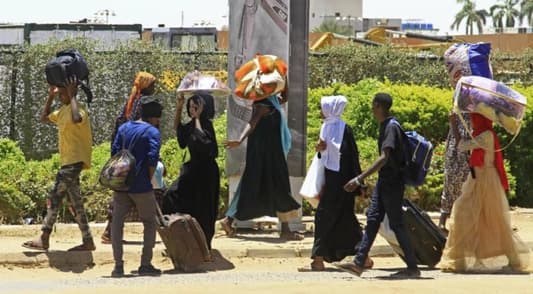A new ceasefire deal that was struck between Sudanese troops and paramilitary forces in Khartoum has so far been fruitless, heightening concerns over diminishing food provisions and a breakdown of essential medical services.
The 24-hour ceasefire – lobbied for by countries trying to evacuate their citizens after days of conflict – was supposed to come into effect at 6 pm local time. However, eyewitnesses in Khartoum said the fighting continued on Wednesday.
‘We can still hear shelling in the vicinity of the presidential palace and the general command of the military’.
‘The ceasefire is not unconditional, with both sides saying they will abide by it only if they are not fired at by the other party,’ she added.
Earlier in the day, continuous bombardments could be heard in central Khartoum around the compound housing the army headquarters – where Sudan’s military ruler, General Abdel Fattah al-Burhan, had said he was based earlier in the week. It was not clear if he was still there.
Read Also: Deadly Fighting Continues In Sudan Despite Ceasefire Deal
‘The armed forces are responding to a new attack in the vicinity of the General Command,’ an army statement said.
There was another heavy exchange of gunfire in the Jabra neighbourhood of west Khartoum, where homes belonging to paramilitary leader General Mohamed Hamdan Dagalo, widely known as Hemedti, and his family are located, Reuters news agency reported.
Hemedti’s location has not been revealed since the fighting began on Saturday.
Blasts also rang out from the main airport, shut down after the conflict burst out of a power struggle between al-Burhan and Hemedti over a plan to integrate Hemedti’s Rapid Support Forces (RSF) into the regular military.
Thick smoke billowed into the sky and the streets of the capital, one of Africa’s largest cities with some 5.5 million people, were largely empty.
No fewer than 270 people have died and 2,600 have been injured, Sudan’s health ministry estimates. Nine hospitals have been hit by artillery and 16 had to be evacuated, the Sudanese Doctors’ Union said, with none operating fully inside the capital.
Their conflict has dashed hopes for progress towards democracy in Sudan, risks drawing in its neighbours, and could play into regional competition between Russia and the United States. Sudan sits strategically between Egypt, Saudi Arabia, Ethiopia, and Africa’s volatile Sahel region.

